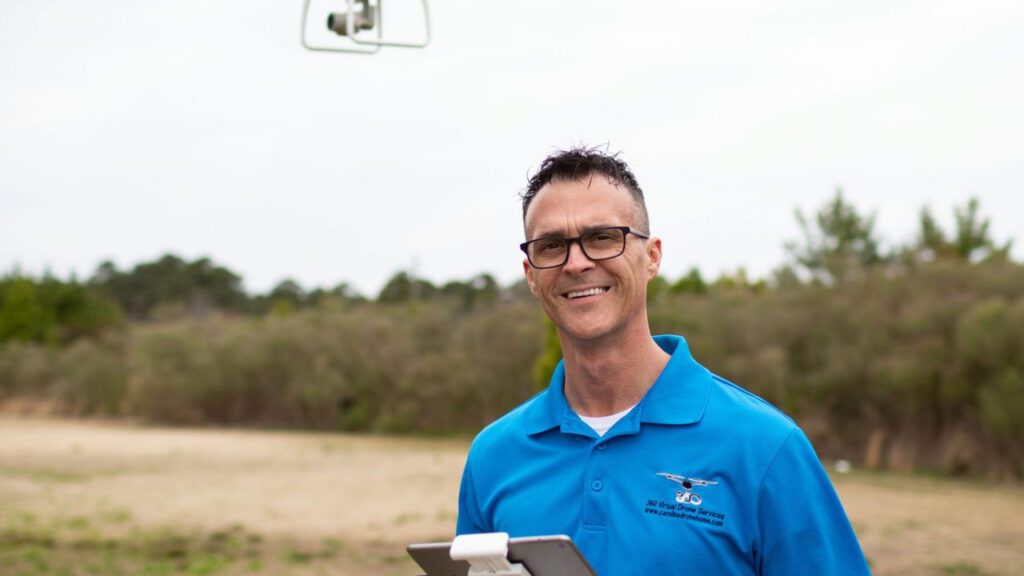 Michael Jones asks the court to uphold his right to provide aerial information to clients.
Michael Jones asks the court to uphold his right to provide aerial information to clients.
Yesterday, the Institute for Justice (IJ) filed a petition with the United States Supreme Court on behalf of Michael Jones, a drone photographer in North Carolina. The case brings forward an important question: does providing data and information through aerial photographs qualify as speech that the First Amendment fully protects, or do state licensing boards have the authority to censor it?
For several years, North Carolina’s land-surveying board has targeted small drone operators, including Michael Jones, claiming that their aerial maps amount to illegal land surveying. Unlike many states, North Carolina classifies even basic aerial mapping as surveying. This requires operators to hold a full surveyor’s license, which demands years of education and experience. The state has enforced this law rigorously, threatening drone businesses with severe penalties.
Jones’ Legal Battle
Michael Jones, based in Goldsboro, North Carolina, is an FAA-licensed drone operator who sought to build an aerial-mapping business. His goal was to provide landowners with aerial perspectives, which they often find useful without needing a full land survey. He wanted to use his drone to capture images and create maps or 3D models using publicly available tools.
However, in 2019, the North Carolina surveying board issued a cease-and-desist letter. The board ordered Michael to shut down his operations or face civil and criminal penalties. In response, Michael sued the board, arguing that his maps and photographs are forms of speech protected by the First Amendment.
“I’ve always been clear what I’m doing isn’t setting property lines. It’s simply providing pictures and information,” said Michael. “I even included a big red disclaimer on my website saying I’m not a licensed surveyor, but the board shut me down anyway. I don’t know of any surveying company that was using drones like I was.”
The Fourth Circuit Court Decision
In May, the Fourth U.S. Circuit Court of Appeals rejected Michael’s case. Although visual information and images have long received First Amendment protection, the court ruled that Michael’s creation of maps was “conduct” and not speech. The court’s reasoning was partly based on the fact that Michael’s work takes place on private property, which it claimed gives the government more leeway to regulate.
IJ Senior Attorney Sam Gedge criticized the ruling, stating, “Drone technology may be new, but the principles at stake in Michael’s case are as old as the nation itself. Taking photos and providing information to willing clients is speech, and it’s fully protected by the First Amendment. Only by badly misapplying the First Amendment could the Fourth Circuit hold differently.”
The Fourth Circuit’s ruling conflicts with decisions made in other federal courts. The Fifth Circuit, covering Texas, Mississippi, and Louisiana, and the Eleventh Circuit, covering Florida, Alabama, and Georgia, have issued rulings that favor the protection of such activities under the First Amendment.
A Call for Supreme Court Intervention
With the split between the circuits, Michael is now asking the Supreme Court to take up his case. His petition argues that if the government can stop someone from communicating aerial photographs simply because they contain specific information, First Amendment rights are at risk. “When a government agency sends a cease-and-desist letter telling you to stop communicating photographs containing specific types of ‘data’ and ‘information,’ that’s a red flag that serious First Amendment interests are in play,” said IJ Attorney James Knight.
This is not the first time the Institute for Justice has faced such a challenge. IJ has successfully defended similar cases, including a mapping company in Mississippi that faced similar accusations of unlicensed practice. Michael’s case joins others, including a map maker in California.
The Supreme Court’s decision on whether to hear Michael’s case could have far-reaching implications for First Amendment rights, particularly in an era when technology like drones is rapidly evolving. The outcome may determine whether state licensing boards can regulate new technologies in ways that limit both entrepreneurship and free speech.
Read more:
- North Carolina Drone Operator to Seek Further Review in First Amendment Lawsuit
- Is Drone Mapping a First Amendment Right? This NC Lawsuit Has Major Implications for the Commercial Drone Industry
- Surveyors Wanted to Shut this Drone Photographer Down. Now, He’s Fighting Back. [VIDEO]

Miriam McNabb is the Editor-in-Chief of DRONELIFE and CEO of JobForDrones, a professional drone services marketplace, and a fascinated observer of the emerging drone industry and the regulatory environment for drones. Miriam has penned over 3,000 articles focused on the commercial drone space and is an international speaker and recognized figure in the industry. Miriam has a degree from the University of Chicago and over 20 years of experience in high tech sales and marketing for new technologies.
For drone industry consulting or writing, Email Miriam.
TWITTER:@spaldingbarker
Subscribe to DroneLife here.

 Michael Jones asks the court to uphold his right to provide aerial information to clients.
Michael Jones asks the court to uphold his right to provide aerial information to clients.





Leave a Reply